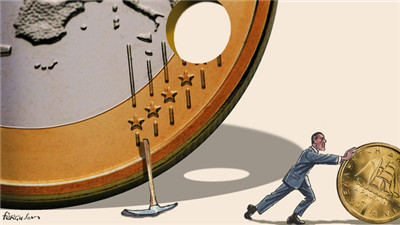(单词翻译:单击)
How would I vote in the referendum on the eurozone’s economic programme if I were Greek? The answer, alas, is that I am unsure. If I believed Greece could make a success of going it alone, I would surely vote against the programme. But I could not be certain: if Greece could use monetary sovereignty wisely, it would not be in its current state. If I voted in favour of the programme, I would not know whether it was still on offer: the eurozone says it is not, but it might be bluffing. What I would know is that, if Greece voted Yes, it might face years of retrenchment and depression. But that might still be better than post-exit chaos.
假如我是希腊人,在针对欧元区经济计划的公投上我会如何投票呢?唉,可惜我也不确定答案。如果我相信希腊单干会取得成功,那么我肯定会投票反对该计划。但是我无法确定:如果希腊可以明智地运用货币自主权,它就不会处于如今的境地。如果我投票支持该计划,我不知道欧元区是否仍然提供这个计划:欧元区说现在不提供,但可能是虚张声势。我知道的是,如果希腊投赞成票,它也许将面临数年紧缩和萧条。但是这可能还是好过退出欧元区后的混乱。

I would also surely wonder whether there might be middle ground. Thus some arguethat it would be possible to stay inside the eurozone even if the government were in default. This might also justify a No vote.
我也肯定会猜想是否还有折中选择。于是有人提出,即使政府违约,但希腊还是有可能留在欧元区。这也许也能成为投反对票的理由。
In making my decision, I would bemoan both the idiotic leftism of my own government and the self-righteousness of the rest of the eurozone. Nobody comes out of this saga with credit.
在做决定时,我既会埋怨我国政府愚蠢的左翼主义,也会为欧元区其他国家的自以为是感到不满。没有哪一方会从这场闹剧中得到赞赏。
The Syriza government has failed to put forward a credible programme of reform that might solve the multiple problems of the Greek economy and polity. It has instead made populist gestures. It is, in brief, a dreadful government produced by desperate times.
激进左翼联盟党(Syriza)政府没能提出可信的改革计划,本来改革或许可以解决希腊经济、政治的多重问题。相反,该政府做出了民粹主义的举动。简而言之,这是个绝望时刻催生的可怕政府。
Yet the eurozone, too, deserves substantial blame for the outcome. One would never guess from its rhetoric that Germany was a serial defaulter in the 20th century. Moreover, there is no democracy, including the UK, whose politics would survive such a huge depression unscathed. Remember, when Germany last suffered a depression of this magnitude, Hitler came to power. Yes, Syriza is the outcome of infantile and irresponsible Greek politics. But it is also the result of blunders committed by the creditors since 2010 and, above all, insistence on bailing out Greece’s foolish private creditors at the expense of the Greek people.
不过,欧元区也理当为这种后果担负主要责任。从德国的言辞中,人们永远也猜不到德国在20世纪曾是违约惯犯。此外,没有哪个民主国家在经历了如此巨大的萧条之后,其政治还能毫发无损,英国也不能。请不要忘记,当德国上一次经历了如此程度的大萧条时,希特勒上台了。没错,激进左翼联盟党就是希腊幼稚而不负责任的政治的产物。但是,它同样也是债权人自2010年以后所犯重大错误的结果,更是欧元区坚持以希腊人民为代价纾困希腊愚蠢的私人债权人的结果。
Yet all these mistakes are now sunk costs. Greeks must look to the future.
不过,如今所有这些错误都成了沉没成本。希腊必须着眼未来。
Even this perspective does not help as much as one would like. The bailout extension did not offer a plausible exit into recovery: it left too big a debt overhang and, more important, demanded too much short-term austerity. Given the recent backsliding, it seems to demand a move from a primary fiscal balance (before interest) of close to zero this year to a surplus of 3.5 per cent of gross domestic product by 2018. Achieving this outcome might demand fiscal measures that would raise the equivalent of 7 per cent of GDP and shrink the economy by 10 per cent.
即使是这个观点也无法像人们所希望的那样起到帮助。纾困延期并未提供一条通往复苏的可行之路,而是造成过于庞大的债务负担,更重要的是它要求希腊实施太多的短期财政紧缩。考虑到最近的经济下滑,这似乎是要求希腊将基本财政余额(付息前),从今年的接近于零,变成到2018年实现相当于国内生产总值(GDP)3.5%的盈余。要实现这一结果,或许就得推出财政措施使财政收入达到GDP的7%,并使经济收缩10%。
One does not put an overweight patient on a starvation diet just after a heart attack. Greece needs growth. Indeed, the economic collapse explains why its public debt has exploded relative to GDP. The programmeshould have eliminated further austerity until growth was established, focused on growth-promoting reforms, and promised debt relief on completion. If the programme on offer was so bad, should I risk voting No? In deciding that I would need to think through what would happen. The short-term position would be clear. The European Central Bank has curtailed emergency support for the Greek banks, forcing tight limits on withdrawals. Some argue this is a huge error. Others believe it is an incentive for voters to vote Yes.
人们不会让肥胖病人在刚刚心脏病发作之后就进行饥饿节食。希腊需要经济增长。的确,经济崩盘解释了希腊公共债务相对于GDP爆炸式增长的原因。欧元区的计划本应该去掉进一步的紧缩,直到希腊重新建立经济增长,应该关注促进增长的改革,并承诺完成改革就予以债务减免。如果欧元区提出的计划太糟糕,那我应该冒险投反对票吗?在做决定时,我需要仔细想想未来会发生什么。短期形势显而易见。欧洲央行(ECB)已经减少对希腊银行业的紧急支援,迫使希腊银行业严格限制取款。有些人认为,这是个巨大的错误。其他人则认为,这是激励选民投赞成票。
If the Greeks voted Yes, the curtailing of ECB support might be reversed. But it is hard to imagine a successful revival of the eurozone’s programme if the present government were still in charge. After campaigning for a No, the latter would surely have lost all the confidence of the creditors. So a new government would have to emerge. It would then also have to sign on the dotted line.
如果希腊人投赞成票,欧洲央行减少支援的情况也许会逆转。但是,如果希腊现任政府继续掌权的话,很难想象欧元区的计划会成功复活。在游说选民投反对票后,希腊当局无疑将失去债权人所有的信心。因此希腊将不得不推出新一届政府。那时,新政府也将不得不签字。
A Yes vote then would offer an unpleasant and uncertain, but at least imaginable future. Now imagine a No vote. There would then be two conceivable outcomes. One would be a true exit. The Greek government would introduce a new currency and convert all contracts under Greek law into it. The new currency would surely then collapse in value relative to the euro. How much it would fall would depend on the policies and institutions (particularly the governance of the central bank) established by the government.
如果希腊人投赞成票,那么这将会带来一个令人不悦而又前途未卜的未来,但这个未来至少是可以想象出来的。现在想象一下投票结果是反对,那么将会有两种可以想象到的结果。第一种是真正退出欧元区。希腊政府将引入新的货币,并在希腊法律下将所有合同转化为新货币计算。新货币必定将对欧元疯狂贬值。它将贬值至何种地步,将取决于希腊政府制定的政策和制度(特别是央行的治理)。
One might reasonably fear the worst. Some even argue that Greece would remain “euroised”. If so, the collapse in the external value of the new currency might offer little gain in competitiveness. Personally, I would be more optimistic: the improvements in competitiveness might well be large.
人们有理由害怕最糟糕的结果。有些人甚至认为,希腊将仍然保持“欧元化”。如果这样,新货币对外价值的崩盘对希腊竞争力的提升可能微不足道。而我个人会更乐观:竞争力的改善幅度很可能很大。
The second outcome would be to stay in the eurozone, despite an insolvent government. This is logically possible. The banking system could be recapitalised by converting uninsured bank liabilities into equity. This looks technically feasible. But it would impose a large negative shock on private wealth.
第二种结果是,尽管政府破产,但希腊继续留在欧元区。这从逻辑上讲是可能的。可以通过将无保险的银行负债转化为权益来对银行系统进行资产重组。这从技术角度来看是可行的。但是这将对私人财富造成巨大的负面冲击。
Whether the ECB would then restart emergency lending and on what scale would become the big questions. This looks an unattractive option to me: it would present all the problems of being part of a currency union, with the additional disadvantages of a comprehensive government default. Better than that surely would be to vote Yes.
接下来,欧洲央行是否将重启紧急贷款,以及规模会有多大,将成为重要问题。这在我看来是个毫无吸引力的选项:它将带来作为货币联盟一分子的所有麻烦,外加政府全面违约造成的损失。投赞成票肯定比这要好。
So I, as a Greek voter, face a choice between the devil and the deep blue sea. The devil is familiar: the never-ending demands of the eurozone for further austerity against which my people voted in the last general election. The deep blue sea is sovereign default and monetary sovereignty. If I am Prime Minister Alexis Tsipras, I think there is a third way — endless bailouts and few conditions. But I am sure he is deluded. So which would I choose? Being cautious I would be tempted to stick with the devil I know. but I might well do better to risk the sea.
因此,作为一名希腊选民,我面临的是一个刀山与火海的两难选择。刀山大家很熟悉:欧元区没完没了地要求希腊进一步紧缩,而希腊人民在上届大选中就对此投了反对票。火海是主权债务违约以及货币自主。如果我是希腊总理亚历克西斯•齐普拉斯(Alexis Tsipras)的话,我想还有第三条路——无止尽的纾困和极少的附加条件。但是我敢肯定他被蒙蔽了。那么我会怎么选择呢?谨慎些的话,我会倾向于坚持我熟悉的刀山。但是如果冒险投身火海,我很可能会过得更好。


